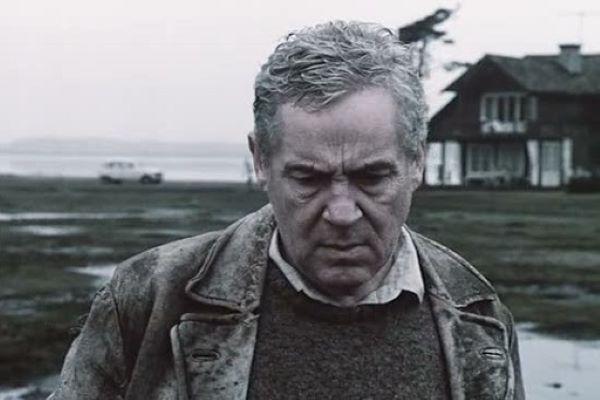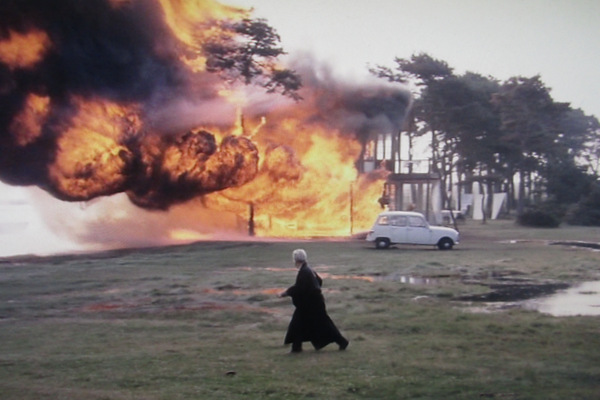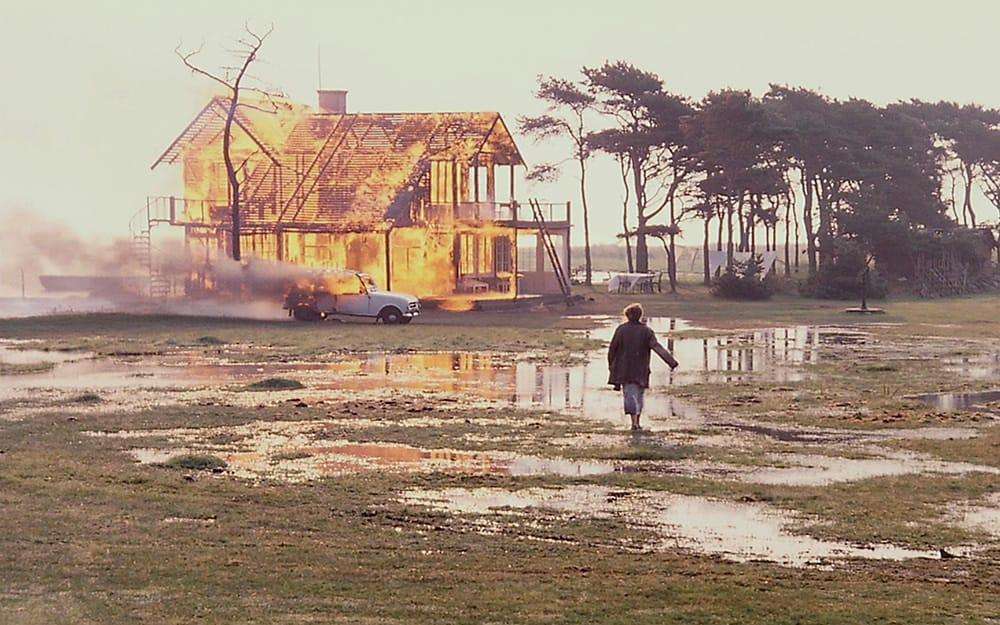Andrei Tarkovsky paid a heartfelt tribute to Ingmar Bergman through his melancholy yet beautiful film The Sacrifice. This is the final film of his life and he made it while undergoing treatment for terminal cancer. Like all his films, this film too deals with the deep philosophical concepts of spiritual awakening, journey, and fulfillment. The protagonist of the film Alexander (Erland Josephson) prays to God so that the world is not destroyed by the nuclear war, and in exchange for this, he is ready to sacrifice everything that he has including his house and his beloved son named “Little Man”. He does not even step back from sleeping with his housemaid Maria. In the end, he does everything that he promised to do in order to save the world from the apocalypse. The Sacrifice is a poetic parable that marks the supreme sacrifice of a human being to save this world. When the advancement of science and technology miserably fails to ensure the safety and well-being of this world, an ordinary man alone shoulders the onus.
The protagonist of the film named Alexander is a retired actor who currently teaches aesthetics. He lives with his actress wife Adelaide (Susan Fleetwood), step-daughter Marta, and his only son Little Man in a beautiful beach house. The film starts on Alexander’s birthday when he along with his adolescent son Little Man plants a tree on the seashore and a postman named Otto (Allan Edwall) delivers him a birthday card. A little later, their family friend Victor (Sven Wollter), who is a doctor, arrives. In a monologue, Alexander points out the emptiness of human life amidst scientific and technological advancements.

Alexander’s family, Victor, and Otto gather at Alexander’s house for his birthday celebration. Housemaid Maria leaves before dinner but the other housemaid Julia stays back. Suddenly, the devastating noises of airplanes shake the house as well as the surrounding area. A television news program reveals it to be a nightmarish nuclear war. Adelaide is so frightened that she suffers a nervous breakdown. Alexander takes God’s shelter and promises to relinquish everything he has in exchange for stopping the war. Otto informs him that Maria is a witch and the only way to stop this deadly war is to sleep with her. After a sudden shock and much hesitation, Alexander finally agrees with Otto, takes his bike, and reaches Maria’s house. She is utterly astonished to see him so late at night in her house where they finally make love when Alexander threatens to kill himself at gunpoint.
The next morning, Alexander gets up on his bed and everything seems to be normal. However, he does not forget his commitment to Lord. While his family members and victor are a little away from the house, he sets it on fire, watches it from a distance, and runs abnormally. When his family members and Victor rush to the spot, he admits that he has done this act. An ambulance is called and two medical workers chase him and then push him inside. Maria follows the ambulance riding her bicycle but stops when she sees Little Man watering the tree that his father planted only a day back. A little later, Maria cycles away. Little Man lies down under the tree and utters his only line in the film – “In the beginning was the word. Why is that Papa?”
The Sacrifice portrays the deep love of a human. Love is one-sided and it does not expect a return. Without love, it is not possible to sacrifice anything. There is no doubt that Alexander deeply loves this world. So, he does not hesitate to sacrifice everything he has to stop the nuclear war. He could think about only his family members and their well-being. But, his heart was full of concern for the entire world. He not only contemplates but also actions. Another important reason for the sacrifice is faith. It is said that one can’t plat a tree without thinking about its lifespan. Tarkovsky uses the planting of the tree as a metaphor to portray Alexander’s faith in God as well as humanity. He vows to God to give up everything he has in exchange for stopping the deadly nuclear war. He has a firm belief that peace can definitely be restored. The world will be jubilant again in spite of getting ravaged by the warplanes. This belief generates hopes in his heart. This deep faith and hope make him confront his beloved Lord and pray. Deep down in his heart, he knows that everything will be alright in the end. When a person is in terrible shape and can’t proceed further and the world looks bleak and gloomy, there is no other way but humbly accept the shelter of God.

Through this film, Tarkovsky highlights the dark sides of scientific and technological advancements. Science and technology are bliss to mankind. Those are supposed to resolve human problems, drive us toward progress, and make this world a better place. Instead of a promising and futuristic world, science and technology are being used for creating nuclear weapons that can erase the world map within a few seconds killing millions of innocent people. Tarkovsky was always apprehensive about the shallow scientific progress that does not have any morality. Life is more important than anything else. Alexander does not step back to do anything to stop the nuclear war. When Otto informs him that Maria is a witch and suggests he sleep with her, he does that in spite of being ashamed and embarrassed. When a person keeps everything at stake, he commits the supreme sacrifice. Tarkovsky depicts the supreme human sacrifice through Alexander. This sacrifice is not only dedicated to the beloved Lord but also to the entire world.
Tarkovsky wrote the screenplay for his film The Witch where the protagonist’s cancer is cured after sleeping with a witch and one day, he gives up everything to live with the witch. However, Tarkovsky did not like the ending. So, he rewrote the screenplay and named it The Sacrifice. The screenplay is melancholy and portrays Alexander’s apprehension, dedication, morality, and sacrifice. Tarkovsky pays his heartfelt tribute to Ingmar Bergman through this film. Bergman’s frequent collaborator cinematographer Sven Nykvist plays with lights and shadows throughout the film. Absolute silence and mystery creep in during the night. Nykvist’s magnificent cinematography captures the phenomenon of the mystic night. Tarkovsky and Nykvist carefully capture Alexander’s state of mind, apprehensions, madness, and actions. The rumbling sound of the airplanes used in the film is terrifying. J.S. Bach’s aria “Have Mercy, My God” from St. Matthew Passion used in the first and last scenes resonates with the melancholia of the film. Bergman’s favorite actor Erland Josephson brilliantly portrays Alexander’s life and psyche. Tarkovsky’s Alexander will always remain one of the most significant examples of sacrifice. The film won the prestigious Grand Prix at the 1986 Cannes Film Festival and is considered a world cinema classic.
